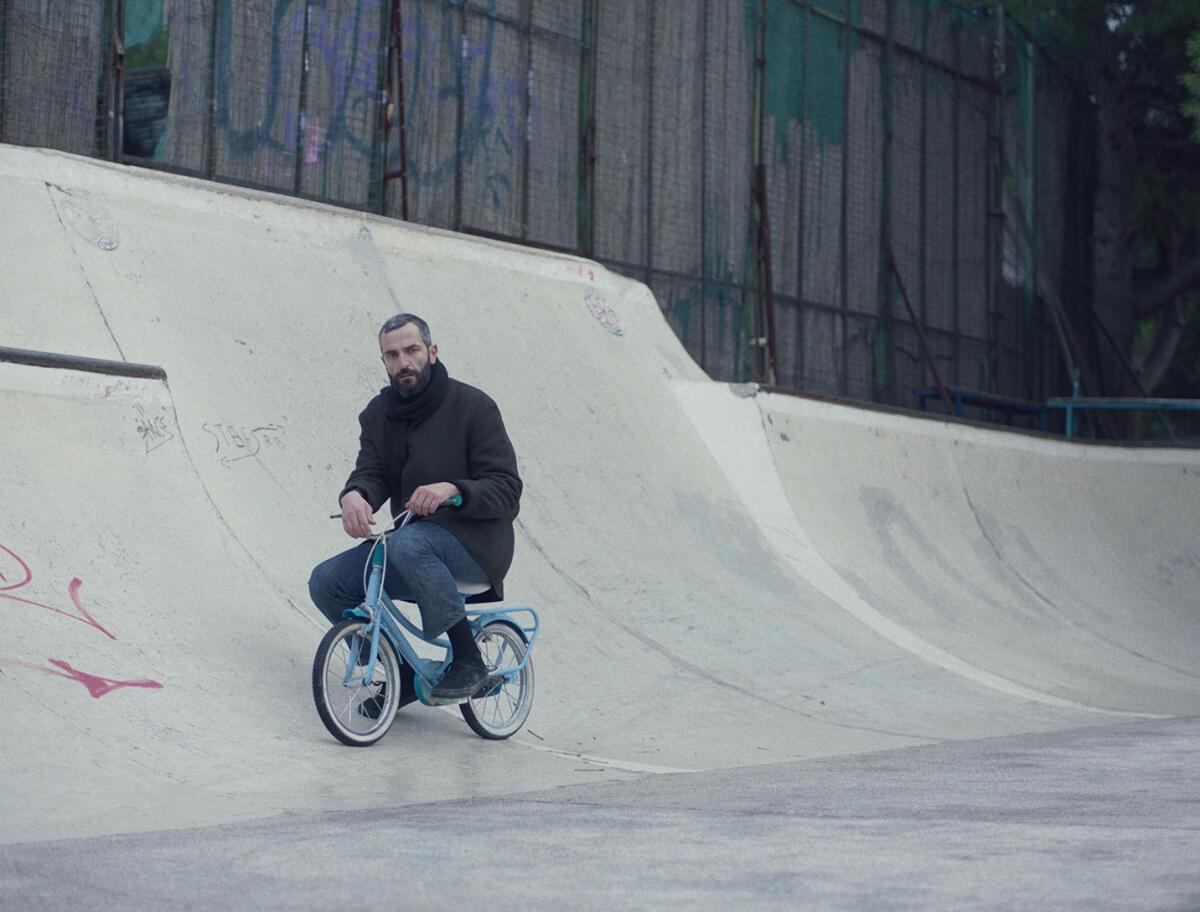Review: Memory and identity vanish in soothing Greek existential drama ‘Apples’

- Share via
Memory, by choice or by accident, fails the aching characters in director Christos Nikou’s unassumingly superb first feature “Apples,” executive produced by Cate Blanchett, in which an epidemic of sudden amnesia sweeps across Greece.
Set in a nondescript past before smartphones became ubiquitous and analog technology still reigned (presumably the late 1990s, based on a movie referenced), the quiet film unfurls in a boxy aspect ratio and submerged in an opaque color palette of grays and light blues. The aesthetic choices exude a visual serenity that matches the story’s overall restrained tone.
For your safety
The Times is committed to reviewing theatrical film releases during the COVID-19 pandemic. Because moviegoing carries risks during this time, we remind readers to follow health and safety guidelines as outlined by the CDC and local health officials.
Expressionless, middle-aged Aris (Aris Servetalis) seems to be the latest victim of the unexplained affliction. Found on the bus sans documentation and with no family to claim him, he becomes an unidentified patient and begins a series of tests to determine what, if anything, he can recall. Like him, many others can’t remember who they were.
The illness not only removes all personal details from a person’s mind, but most information on how the world operates and its social norms. However, in Aris’ case, his predilection for the titular apples appears to suspiciously have been spared in the process.
To deal with those in his situation, the government has set up a program to help them start anew. Via cassette tapes, Aris receives a list of quintessential life experiences and skills he must pursue and document with a Polaroid camera. Some, like riding a bicycle or driving rely on muscle memory, while others push Aris out of his interpersonal comfort zone.
There’s a humorous absurdity to the tasks that seems to comment on our modern obsession with registering every moment with a camera. In a photo album, all these printed images of Aris’ new, forcefully constructed life accumulate like a tactile Instagram profile.
‘Could it be that we are the things we don’t forget? Because in a way, we are our memories,’ asks director Christos Nikou.
One night at the movie theater, he comes across Anna (Sofia Georgovassili), another amnesiac also completing these pillars of the human condition to build a new identity. As a friendship develops between them, more questions emerge about who Aris and Anna are.
Gentle in their narrative approach, Nikou and co-writer Stavros Raptis play it close to the vest, letting the subtext and small shifts in the performance relay nods to its ideas on loss and reinvention. In their impeccable screenplay, one line of dialogue can inconspicuously but intensely expand our understanding of the offbeat premise and of Aris’ motivations.
There are other lyrical touches transmitted in thematically relevant imagery: Aris dresses up as an astronaut for a costume party, reaffirming in an unspoken manner the desire one can feel to leave behind all that you know, to explore new ground, to see one’s life from the outside in, like leaving the planet and looking back at it from outer space.
Even if one considers “Apples” part of the so-called Greek Weird Wave, such a subtly thoughtful and soothing approach to probe at existential concerns, rather than being predictably cynical or violent, makes it stand out.
That Nikou began his career as an assistant director to Yorgos Lanthimos on “Dogtooth,” while Servetalis appeared in that director’s 2011 film “Alps,” might inflate those assumptions about the collective bizarreness and deadpan humor that appears to characterize most of the Hellenic productions that reach our shores.
Late in the picture, in one of the film’s most surprisingly poignant scenes, Aris dances with abandon at a bar as if he has, for a moment or forever, forgotten about shame, reveling in a blissfully uninhibited state. It’s then that Nikou suggests the benefits of becoming a blank slate, unlearning fear and all other imposed social burdens. If no one knows who you were, not even you, then you can be a truer version of yourself.
Yet, what makes “Apples” a delicately affecting gem not to be missed is that the more its layers peel away, the more that apparently inconsequential facts like one’s favorite fruit gain importance as we examine who we become when we no longer have our baggage, both the beautiful and the sorrowful.
There’s a comforting benevolence to not recalling the pain once felt. If we could, we might agree to have all trauma wiped away, and have selective memory only treasuring the good parts of the past. But in reality, we tend to cling vehemently to what no longer is, because joy and suffering are often intertwined, components of a continuum that gives us meaning.
Forgetting can be a blessing, but perhaps the hurt that comes with not letting go is the price for having had a life worth remembering.
‘Apples’
In Greek with English subtitles
Not Rated
Running time: 1 hours, 31 minutes
Playing: Laemmle Monica Film Center, Santa Monica; Laemmle Playhouse 7, Pasadena
More to Read
Only good movies
Get the Indie Focus newsletter, Mark Olsen's weekly guide to the world of cinema.
You may occasionally receive promotional content from the Los Angeles Times.










